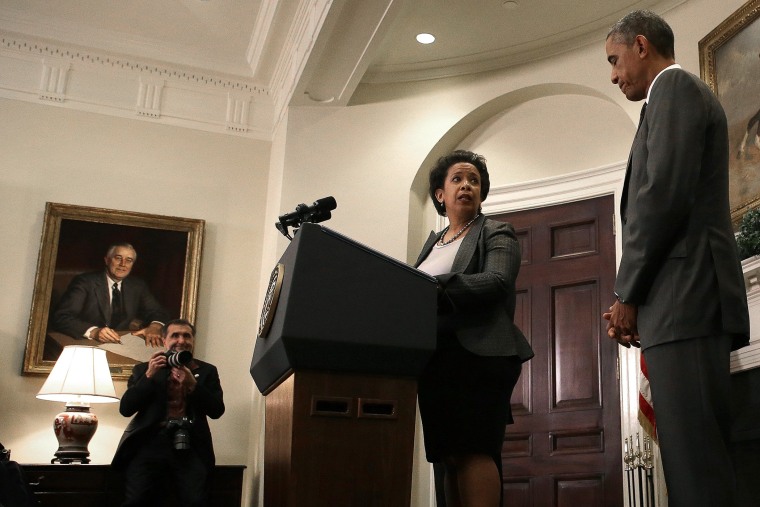The White House had previously indicated that President Obama wouldn't attempt to replace Attorney General Eric Holder until after Congress' lame-duck session, so it came as something of a surprise when we learned in recent days that federal prosecutor Loretta Lynch was poised to get the nod.
Earlier today, that became official.
President Obama on Saturday nominated New York federal prosecutor Loretta Lynch to succeed Eric Holder as attorney general, making her the first African-American woman chosen to be the top law enforcement official in the county. At an event in the White House's Roosevelt Room, Obama bid farewell to Holder, who announced in September he would step down as attorney general, and praised Lynch as the most qualified to take over the post. "Loretta might be the only lawyer in America who battles mobsters and drug lords and terrorists and still has the reputation for being a charming people person," Obama said.
By any fair measure, no one will question her credentials, which include great successes as a prosecutor and an impressive educational background. Sen. Lindsey Graham (R-S.C.), hardly a White House ally, described Lynch as a "solid," qualified choice.
Given the political environment, though, it's only natural to wonder whether other Senate Republicans -- currently in the minority, but soon to be in the majority -- will be equally as receptive. For what it's worth, if Obama was looking for someone who'd be easy to confirm, he chose someone who's already been through the confirmation process twice as a U.S. attorney nominee. In both cases, Senate support was so overwhelming there wasn't even a vote -- she was simply confirmed by unanimous consent without objection.
The history matters, of course, since it suggests Lynch probably won't be the target of a partisan food fight, with an emphasis on the "probably."
The next question is when, which may be the contentious question about this nomination.
Incoming Senate Majority Leader Mitch McConnell (R-Ky.) said today he wants his GOP-led Senate to consider Lynch early next year, but there's no obvious reason to wait that long. There's ample precedent of senators voting to confirm other cabinet nominees in lame-duck sessions, so it's entirely possible the Democratic-led Senate will take up her nomination this month.
It's equally possible this will be yet another issue for a sharp political dispute, before Lynch's ability to do the job even draws scrutiny.
If McConnell expects to delay the process just for the sake of delay, he may need a reason other than, "I'd just like that better." Indeed, because all pending nominations expire at the end of a Congress, the president would have to re-nominate Lynch in January if the Senate pushes off the confirmation process.
